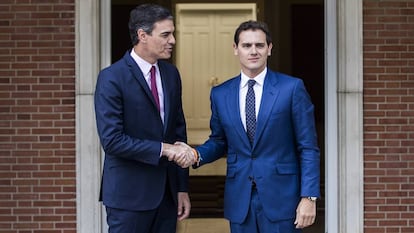Post-election Spain: “Agreeing to agree” is the only certainty so far
Acting PM Pedro Sánchez met with the leaders of Ciudadanos and Podemos on Tuesday in a bid to forge governing alliances following the general election of April 28

Spain’s acting prime minister, Pedro Sánchez, met with two more opposition leaders on Tuesday, a day after sitting down with Popular Party (PP) president Pablo Casado to discuss the way forward following the general election of April 28, which yielded a fragmented parliament.
Sánchez – whose Socialist Party (PSOE) earned the most seats (123) but is still short of the 176 required for an overall majority – is meeting the opposition to “normalize institutional relations and political dialogue” following a particularly harsh campaign, said sources at La Moncloa, the seat of government.
Political leaders will later meet with King Felipe VI to determine whether any candidate to be the next prime minister of Spain has enough support from parliament, and to set a date for the investiture vote. There is a precedent for failure following the December 2015 election, when lack of support for any one nominee led to a new election six months later.
On Tuesday, Sánchez first met with Ciudadanos (Citizens) leader Albert Rivera. While an alliance of both parties would yield 180 seats, more than enough for an overall majority, Rivera has made it clear that he will not be supporting the Socialist leader’s bid for reinstatement.
During the 50-minute meeting, Rivera underscored that his plan is to try to be the leader of the opposition in Congress, even if his party earned nine fewer seats than the PP. The head of Ciudadanos feels that the mainstream conservatives, who sustained a resounding defeat at the election – dropping from 137 to 66 seats – are “breaking apart,” leaving room for Ciudadanos to take over the leadership of the center-right space in Spanish politics.

On the subject of Catalonia, Rivera demanded an immediate reintroduction of direct rule through special constitutional powers, which was implemented for several months after the unconstitutional referendum and unilateral independence declaration of October 2017. By contrast, the PP’s Pablo Casado did not mention the issue at his Monday meeting with Sánchez, which was significantly longer as well as more cordial, according to government sources.
Where Rivera did offer cooperation is on the possibility of reaching state pacts on education, depopulation, immigration, security and the fight against terrorism.
Podemos: agreeing to agree
The government of Spain thus depends on the relationship between the PSOE and the leftist Unidas Podemos: together, these two groups have 165 deputies, which still requires support from 11 more representatives, and likely means courting the Catalan nationalists. The acting PM was widely criticized by the opposition throughout his 10-month tenure for having won the no-confidence vote against Mariano Rajoy thanks to help from Catalan separatist parties. During the campaign, the right accused Sánchez of “selling out” to secessionists, despite his insistence that no deals had been made.
While Sánchez and Podemos leader Pablo Iglesias appear to be in sync, there is an obstacle in the way: the Socialists want to head a minority government with support from Podemos, while the latter wants a coalition government with portfolios for some of its leading members.
And then there is the issue of Catalonia: Podemos defends a negotiated referendum on independence, while the PSOE does not. It will be a long negotiation that is expected to produce a detailed governing program, in the manner of the coalitions in Germany and the Netherlands. Both parties have experience working together on the 2019 budget plan, which was ultimately rejected due to lack of support from Catalan separatist parties who wanted more concessions regarding the independence drive.
Podemos wants a coalition government with portfolios for some of its leading members
After a two-hour meeting on Tuesday, both men agreed to play down the tension and give themselves time for a lengthy negotiation that is not expected to yield any major results until after the May 26 local, regional and European elections.
At a speedy news conference on Tuesday lasting under five minutes, a laconic Iglesias deflected reporters’ questions and illustrated the situation with a statement reminiscent of Groucho Marx: “We have agreed that we need to agree,” he said with a half-smile.
English version by Susana Urra.
Tu suscripción se está usando en otro dispositivo
¿Quieres añadir otro usuario a tu suscripción?
Si continúas leyendo en este dispositivo, no se podrá leer en el otro.
FlechaTu suscripción se está usando en otro dispositivo y solo puedes acceder a EL PAÍS desde un dispositivo a la vez.
Si quieres compartir tu cuenta, cambia tu suscripción a la modalidad Premium, así podrás añadir otro usuario. Cada uno accederá con su propia cuenta de email, lo que os permitirá personalizar vuestra experiencia en EL PAÍS.
¿Tienes una suscripción de empresa? Accede aquí para contratar más cuentas.
En el caso de no saber quién está usando tu cuenta, te recomendamos cambiar tu contraseña aquí.
Si decides continuar compartiendo tu cuenta, este mensaje se mostrará en tu dispositivo y en el de la otra persona que está usando tu cuenta de forma indefinida, afectando a tu experiencia de lectura. Puedes consultar aquí los términos y condiciones de la suscripción digital.








































